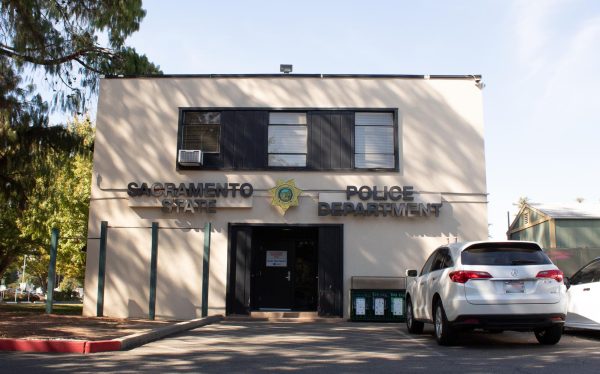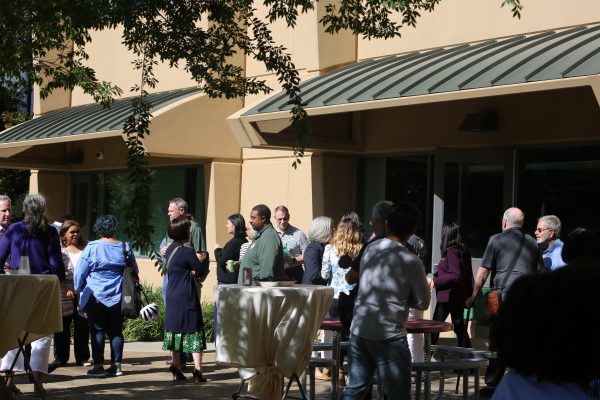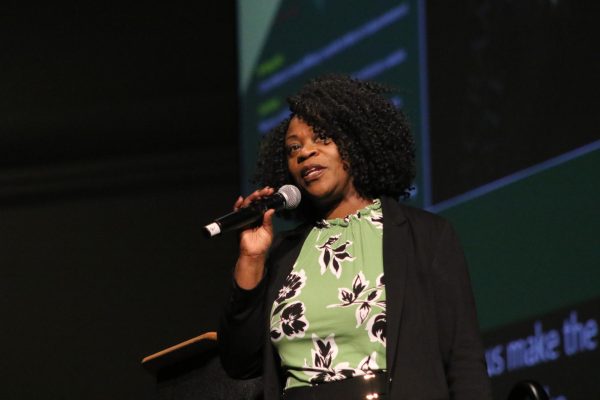Support crosses border
March 15, 2005
For two weeks, pink crosses built by Tanisha Searle, a Sacramento State student, and The Brown Syndicate, a campus club that promotes the Raza arts, have stood in the quad to draw attention to an ongoing problem in Ciudad Juarez, Mexico.
In Ciudad Juarez, more than 400 women have disappeared in the last 10 years. The women’s dead bodies were later found in the desert bearing signs that they had been tortured and sexually assaulted before they were killed.
Each time a body is discovered in Ciudad Juarez, a pink cross is erected where the body was found.
Searle said she wanted to display the crosses to draw attention to the problem instead of just advertising a speaking event.
“When people see the crosses, they begin to ask questions and begin wondering what they mean. It’s surprising how many students have actually stopped to read the signs and look into what we are trying to do,” she said.
Another art exhibit by The Brown Syndicate was displayed on Tuesday when Jessica Marques of the Mexico Solidarity Network, a group working to help the women of Ciudad Juarez, spoke at Sac State with the mother of one of the victims.
The event was part of Women’s History Month and was put together by Searle, a women’s studies student who became interested in Ciudad Juarez after hearing about it in “The Vagina Monologues.”
Patricia Grady, Women’s Resource Center director, went to Ciudad Juarez with Searle in November 2004 as part of a caravan by Mexico Solidarity Network to get a better idea of what was happening there, and Searle said when she got back she felt she really needed to do something to raise awareness.
She said that’s when she approached the Women’s Resource Center about doing the event.
When Grady said she would help put together the event, Searle began contacting other groups, such as Sac State’s chapters of Mecha and the National Organization of Women, to get them involved.
At the event, Patricia Cervantes, mother of victim Neyra Cervantes, spoke with Marques as a translator. She has been touring around California with the help of Mexico Solidarity Network to ask for help in finding her daughter’s murderers and to ask for the release of her son David Meza, who was tortured into admitting that he committed the crime. He was not in Ciudad Juarez at the time of his sister’s disappearance.
“It’s a very terrible situation, and I don’t think that people here are really aware of how bad it is,” Grady said. “But it is also amazing to see these women, mothers, who are already held in such low esteem in Mexico, to take on the government and the police.”
The victims’ mothers have sought help from several organizations, including Mexico Solidarity Network, which began in 1998 to help factory workers in Mexico receive better pay and more workers’ rights after the North American Free Trade Agreement was passed.
Marques said soon after the group arrived, mothers of missing women began asking the group to help investigate the murders.
“Our primary goal with the speaking tour is to educate people about the situation and encourage them to put pressure on government officials,” Marques said.
Marques said her group has had some success raising awareness in Congress with the help of U.S. Rep. Hilda Solis, D-Calif., who last week reintroduced a resolution to express concern and propose actions to address the murders and disappearances in Ciudad Juarez.
Solis visited Ciudad Juarez in 2003 as part of a congressional delegation and has introduced a resolution every year since, asking for action.
In a March 10 press release, Solis said, “While we’ve made advances in these last years to address the murders and disappearance of young women, there were over 30 murders in Ciudad Juarez and Chihuahua City over the past year. This bill calls for comprehensive bilateral efforts to end these ongoing murders.”
—————————————————————————————-
Rebecca Adler can be reached at [email protected]


































































































































